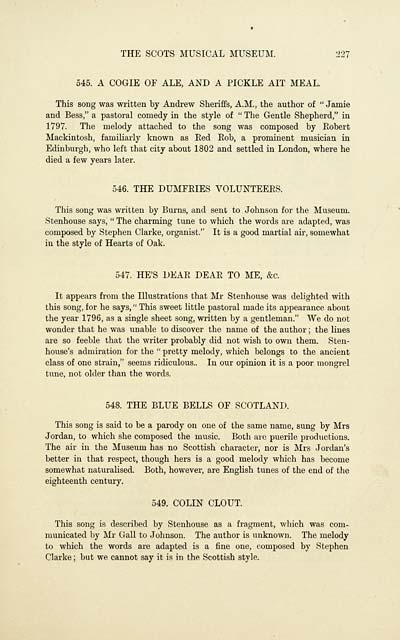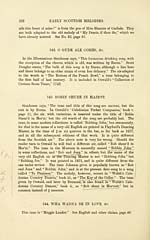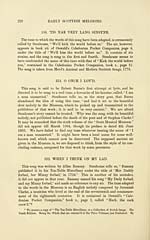Inglis Collection of printed music > Printed text > Early Scottish melodies
(249) Page 227 - Cogie of ale, and a pickle ait meal
Download files
Complete book:
Individual page:
Thumbnail gallery: Grid view | List view

THE SCOTS MUSICAL MUSEUM. 227
545. A COGIE OF ALE, AND A PICKLE AIT MEAL.
This song was written by Andrew Sheriffs, A.M., the author of " Jamie
and Bess," a pastoral comedy in the style of " The Gentle Shepherd," in
1797. The melody attached to the song was composed by Eobert
Mackintosh, familiarly known as Red Rob, a prominent musician in
Edinburgh, who left that city about 1802 and settled in London, where he
died a few years later.
546. THE DUMFRIES VOLUNTEERS.
This song was written by Burns, and sent to Johnson for the Museum.
Stenhouse says, " The charming tune to which the words are adapted, was
composed by Stephen Clarke, organist." It is a good martial air, somewhat
in the style of Hearts of Oak.
547. HE'S DEAR DEAR TO ME, &c.
It appears from the Illustrations that Mr Stenhouse was delighted with
this song, for he says, " This sweet little pastoral made its appearance about
the year 1796, as a single sheet song, written by a gentleman." We do not
wonder that he was unable to discover the name of the author ; the lines
are so feeble that the writer probably did not wish to own them. Sten-
house's admiration for the " pretty melody, which belongs to the ancient
class of one strain," seems ridiculous.. In our opinion it is a poor mongrel
tune, not older than the words.
548. THE BLUE BELLS OF SCOTLAND.
This song is said to be a parody on one of the same name, sung by Mrs
Jordan, to which she composed the music. Both are puerile productions.
The air in the Museum has no Scottish character, nor is Mrs Jordan's
better in that respect, though hers is a good melody which has become
somewhat naturalised. Both, however, are English tunes of the end of the
eighteenth century.
549. COLIN CLOUT.
This song is described by Stenhouse as a fragment, which was com-
municated by Mr Gall to Johnson. The author is unknown. The melody
to which the words are adapted is a fine one, composed by Stephen
Clarke ; but we cannot say it is in the Scottish style.
545. A COGIE OF ALE, AND A PICKLE AIT MEAL.
This song was written by Andrew Sheriffs, A.M., the author of " Jamie
and Bess," a pastoral comedy in the style of " The Gentle Shepherd," in
1797. The melody attached to the song was composed by Eobert
Mackintosh, familiarly known as Red Rob, a prominent musician in
Edinburgh, who left that city about 1802 and settled in London, where he
died a few years later.
546. THE DUMFRIES VOLUNTEERS.
This song was written by Burns, and sent to Johnson for the Museum.
Stenhouse says, " The charming tune to which the words are adapted, was
composed by Stephen Clarke, organist." It is a good martial air, somewhat
in the style of Hearts of Oak.
547. HE'S DEAR DEAR TO ME, &c.
It appears from the Illustrations that Mr Stenhouse was delighted with
this song, for he says, " This sweet little pastoral made its appearance about
the year 1796, as a single sheet song, written by a gentleman." We do not
wonder that he was unable to discover the name of the author ; the lines
are so feeble that the writer probably did not wish to own them. Sten-
house's admiration for the " pretty melody, which belongs to the ancient
class of one strain," seems ridiculous.. In our opinion it is a poor mongrel
tune, not older than the words.
548. THE BLUE BELLS OF SCOTLAND.
This song is said to be a parody on one of the same name, sung by Mrs
Jordan, to which she composed the music. Both are puerile productions.
The air in the Museum has no Scottish character, nor is Mrs Jordan's
better in that respect, though hers is a good melody which has become
somewhat naturalised. Both, however, are English tunes of the end of the
eighteenth century.
549. COLIN CLOUT.
This song is described by Stenhouse as a fragment, which was com-
municated by Mr Gall to Johnson. The author is unknown. The melody
to which the words are adapted is a fine one, composed by Stephen
Clarke ; but we cannot say it is in the Scottish style.
Set display mode to: Large image | Transcription
Images and transcriptions on this page, including medium image downloads, may be used under the Creative Commons Attribution 4.0 International Licence unless otherwise stated. ![]()
| Special collections of printed music > Inglis Collection of printed music > Printed text > Early Scottish melodies > (249) Page 227 - Cogie of ale, and a pickle ait meal |
|---|
| Permanent URL | https://digital.nls.uk/94646260 |
|---|---|
| Description | Also: The Dumfries volunteers. Also: He's dear dear to me. Also: The blue bells of Scotland. Also: Colin Clout. |
| Description | Scottish and English songs, military music and keyboard music of the 18th and 19th centuries. These items are from the collection of Alexander Wood Inglis of Glencorse (1854 to 1929). Also includes a few manuscripts, some treatises and other books on the subject. |
|---|
| Description | The Glen Collection and the Inglis Collection represent mainly 18th and 19th century Scottish music, including Scottish songs. The collections of Berlioz and Verdi collected by bibliographer Cecil Hopkinson contain contemporary and later editions of the works of the two composers Berlioz and Verdi. |
|---|

